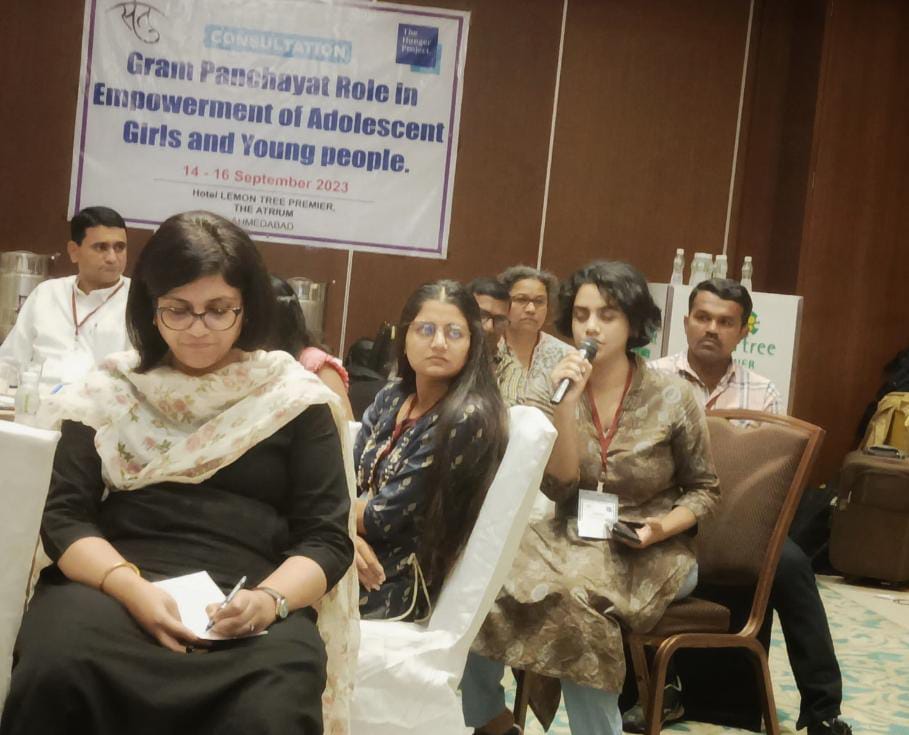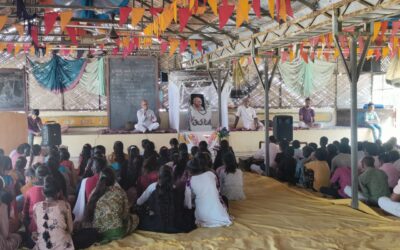The Gram Panchayat often tend to be a traditionally dominating body and can have complex systems that make it challenging to have a coordinated system of governance, with planned and holistic facilitation. At the same time, it can also create space for advancement in distribution of power and to connect with the citizens based upon their needs. I recently got to be a part of a consultation in Ahmedabad on the topic ‘Role of Gram Panchayat in Empowerment of adolescent girls and young people’ and this churning is a result of that.
SETU Abhiyan (the organization I’m working with) and The Hunger Project conducted this 3-day consultation. It was an interesting opportunity to get to know people who have been closely working to understand the communities and strengthen their rights. Quoting Abha Bhaiya, a founding member at Jagori, “Unless we identify the myriad ways in which people from different sections of the society face challenges, we cannot really hope to get ahead of the game.” To put it in context, she was stressing on the everyday choices we make at an individual level. And the exploitation we inflict upon others in our society, must not go unnoticed.
The discourse, although brief, encapsulated the manner in which the work has been carried out. Plus, the availability of resources, and the various societal challenges that exist. It also challenged the manner in which we attempt to perceive a particular gender, age group, caste, or class. It promoted dialogue on subjects that introduced an array of vantage points to think about, each showcasing different mechanisms.

Reinventing Perceptions
How we relate to a particular gender and age group and understand them, their fears and hopes, dreams and aspirations, and understand what makes their life easier or harder, is extremely crucial. What are the opportunities that are available to them, and the choices they can make within the society? Plastering something upon the lives of women and girls at the village level and mandating it without knowing how it plays out for them does not lead to sustainable action on an issue.
Where I work in the villages of Kutch, a collective of people has been formed. There’s a system in place to run it. But how is it functioning on ground? Whose responsibility is it to make sure it runs well? Is it really serving a need? Is it not an incentive by itself? If not, why does it exist, and what can we do to administer a more beneficial and effective structure?
Collectivisation For Access
Targeting and empowering adolescent girls also is an enabler for women to participate more; and exercise their citizenship with an increased sense of awareness and responsibility. Change has to take place in every household. Earlier, the women used to approach Gram Panchayat through their husbands or they would not do it at all.
Also Read: Balika Panchayat – Creating A Platform For Adolescent Girls
Women are now taking the Balika Panchayat’s help to connect with the local government. Before the formation of Balika Panchayats, the girls had no interaction or opportunity of access to local government. Therefore, if we want to achieve integrated inclusive development at village level, it is crucial for Gram Panchayats to create a space in their discussions. For girls to present their needs, allocate a certain budget for them, and work together on several issues locally.

There is a constant need to shift our viewpoint to look at grassroots. Facilitating dialogue is essential in every sphere to incorporate and sustain change. Collective ownership is the key to focus on the aim of systemic change. Only then the existing problems can be tackled and further resources can be tapped into as well as utilised.



0 Comments